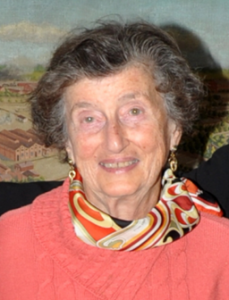In the UBC Department of Obstetrics and Gynaecology we have the great good fortune of being the home department of many leading researchers. We will feature one of these researchers every two months. Our inaugural featured researcher is Dr Nelly Auersperg, a pioneer of gynecological cancer research who began her research career in the 1960s and continues to publish.
 Dr. Auersperg joined our department in 1993 and remains a Professor Emerita. She continues to support and inspire new researchers, establishing the Nelly Auersperg Award in Women’s Health Research in 2003 . She very kindly took some time from busy academic and personal life to share her insights.
Dr. Auersperg joined our department in 1993 and remains a Professor Emerita. She continues to support and inspire new researchers, establishing the Nelly Auersperg Award in Women’s Health Research in 2003 . She very kindly took some time from busy academic and personal life to share her insights.
What drew you to research?
- While in medical school and during subsequent training, I realized that I was most interested in the mechanisms that underlie diseases, their causes, and their responses to therapy.
What advice would you give to some starting their research career now?
- Follow whatever aspect of medicine excites you most; make sure that the lifestyle it requires does not conflict with your plans for your personal life. Basic research, if it is to be successful, means hard work, long hours and personal sacrifices.
You’re research career spans over five decades and you are still actively publishing – what motivates you?
- I still find biology in general, and cancer biology in particular, the most interesting and exciting topic I know of, and one where I can still contribute to medical science in a way that may be of practical use for cancer patients. Not having a lab or a research grant since my retirement prevents me from doing hands-on research, but I still follow the literature and when I come across something timely and thought-provoking where I can make a contribution, I write papers. Since I retired at age 80, I have published or co-authored 25 refereed journal articles, mainly pertaining to ovarian cancer.
Of which achievements are you most proud? Why?
- There are several achievements that I am proud of:
- As my first research topic, in the 1960s, I established a program to investigate growth and differentiation of cervical cancers. This work resulted in improved culture methods, information on early cytogenetic changes, microenvironment influences, and the development of the first human cervical cancer lines with defined differentiation, which contributed to the discovery of HPV as the cause of cervical cancer , by the Nobel-prize winner Zur Hausen.
- Since the 1970s, my interests have centered on ovarian cancer and on the biology of ovarian surface epithelium, a potential source of ovarian cancers which, at the time, was completely undefined. I developed methods to culture this epithelium. I investigated the regulation of its growth and differentiation, epithelio-mesenchymal transformation, responses to and production of bioactive factors , influence of BRCA1 mutations, signaling, and in vitro transformation to ovarian carcinoma cells. My most recent interests center on ovarian stem cells, early detection markers, and relationships between tubal and ovarian carcinogenesis. My research resulted in over 200 refereed publications and 11 book chapters, I was invited to present my work at numerous conferences and seminars on 4 continents.
- I am particularly proud of the more than 60 graduate students and post-doctoral fellows that I mentored, and of their subsequent successful careers in medicine, research, and biotechnology.
- Lastly, I am proud of many awards, including being one of the first Terry Fox Cancer Research Scientists (the highest award for cancer researchers in Canada) in 1985, and being a Fellow of the Royal Society of Medicine (UK) since 2008, the establishment of the Nelly Auersperg Award in Women’s Health Research at B.C. women’s Hospital in 2003, the Doctor of Science Honorary degree by Simon Fraser University in 2008, and Life-time Achievement Awards by the Society for In Vitro Biology (USA), the UBC Faculty of Medicine and the UBC Alumni Association, in 1997, 2007 and 2011 respectively.
When you aren’t working on your research how do you spend your time?
- I am involved in several charities, attend opera and concerts, try to spend time with my children and six grandchildren, and travel on occasion.
Learn more about Nelly and her distinguished career